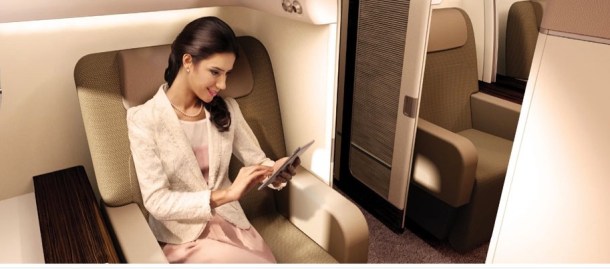
After a few delays Garuda has switched on its state-of-the-art Panasonic inflight wi-fi high speed internet service on its new Boeing 777-300ERs.
Considering that these were originally going to be flying the Sydney-London route by next month but for runway upgrades underway at Garuda’s Jakarta hub, it is timely to ask whether Qantas should remain disconnected from inflight internet services when its A380s were actually delivered from the factory with a good system identical to the one found on Emirates A380s already installed.
Garuda’s 777 flights to London are now expected to begin in May next year, and it is apparent that Emirates, Etihad, Singapore Airlines, and most likely Japan Airlines, Qatar and United will be among competitors on various routes that will by then either offer, or be close to offering web connectivity.
Emirates has been unofficially reported as working on extending its wi-fi availability to its 777-300ERs, and Etihad, having put its new -300ERs on many of its slots, already has connectivity. Virgin Australia has been quiet on the topic, but with rumoured upgrades to the interior of its 777s it’s a fair bet that it doesn’t intend to leave its customers in disconnected limbo like those of Qantas for the duration of what can be very long flights.
Maybe the question should be put a different way. Why would you actually withdraw from providing web connectivity on A380s as Qantas did last December when you have to fight in the market place to be as relevant as possible to business travellers and those for whom their iPhones and Samsungs or whatever, or their tablets, are an integral part of the connected on-line culture?
When Qantas made the decision not to give its premium passengers on its A380s any more web access, what assumptions was it making about them? That they were less enterprising? That they didn’t need to know what was going on in the outside world?
Qantas at the time said the internet services it had been providing on a trial basis simply hadn’t gathered enough support. Maybe however the question, or the availability, as to whether passengers wanted to be connected wasn’t well enough put out.
The decision has always puzzled many contributors to various forums. It isn’t as though the internet connection made by flyers is going to somehow impinge on the cabin amenity of others the way mobile phone use for voice would?
Voice calls from aircraft have never caught on. Even on Emirates, where you can use your mobile to make voice calls in flight, I’ve never actually heard anyone on the phone, unlike too many on the phone all the time in public places or public transport at the rail, bus or ferry altitudes.
The real merit of being able to connect to the internet in flight is that you keep in touch with people and developments, and you arrive at your destination with you messages all dealt with, and no ‘you’ll never guess what happened to your job/contract/customer while you were flying’ calls as you head for the hotel.
Qantas shouldn’t be only for ‘drop outs’ who want to be cut off for the duration of the flight. It should be for everyone.
But back to Garuda. This is what it said in the Asia trade media this week.
From this month, passengers in all classes aboard the new twin-aisle aircraft will be able to access the internet via their smartphones, tablets or laptops during the flight. The service will be offered free-of-charge to first class passengers, while those in business and economy class will be able to purchase Wi-Fi vouchers for US$11.95 per hour, or US$21.95 for 24 hours.
“We hope this service will benefit our customers even more because now they can still conduct business from the sky. It’s part of our new service concept programme which launches our new first class service and promotes much improved executive class and economy class service,” said Garuda’s director of services, Faik Fahmi.
In-flight Wi-Fi is currently only available onboard the airline’s B777-300ER, but Garuda said it plans to expand the service to its fleet of Airbus A330-200 and A330-300 in the future.








Crikey is committed to hosting lively discussions. Help us keep the conversation useful, interesting and welcoming. We aim to publish comments quickly in the interest of promoting robust conversation, but we’re a small team and we deploy filters to protect against legal risk. Occasionally your comment may be held up while we review, but we’re working as fast as we can to keep the conversation rolling.
The Crikey comment section is members-only content. Please subscribe to leave a comment.
The Crikey comment section is members-only content. Please login to leave a comment.